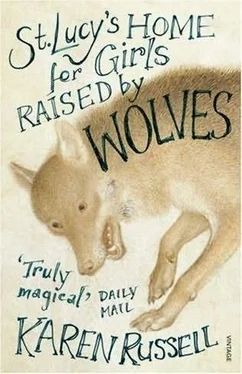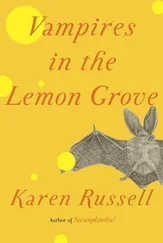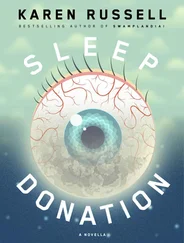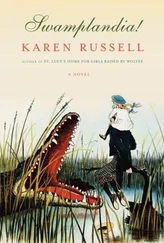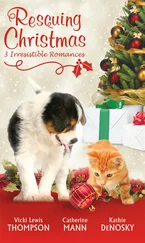Now I’m angry. This Bird Man has ruined the dawn; his clammy touch feels like getting out of a bath and putting your filthy clothes back on.
But I just nod. “Yes, sir,” I say politely. I’m lonely, and I want to have a secret with somebody. I picture Ossie coming home to my empty cot, and get a terrible jolt of pleasure.
When you are a kid, you do things for dumb reasons. The Bird Man tells me that he likes my freckles.
“Listen to this, Ava.”
I inch forward until I am standing at the edge of the pier.
The Bird Man leans towards me, tilting the airboat so that its hull scrapes against the dock, his thin fingers curled around the rail. The rising sun turns the canal between us a brilliant red. White clouds rinse downriver. The Bird Man locks eyes with me again, that agate, unnervingly fixed stare, and purses his lips.
The first four sounds he makes are familiar. The green-backed heron, the feral peacock, a bevy of coots. Then he makes another noise, keener, as close to an alligator bellow as I have heard a human make, but not quite that, exactly. A braided sound, a rainbow sound. I step closer, and closer still, in spite of myself. I try to imagine what species of bird could make a sound like that. A single note, held in an amber suspension of time, like my art class charcoal of Icarus falling. It is sad and fierce all at once, alive with a lonely purity. It goes on and on, until my own lungs are burning.
“What bird are you calling?” I ask, finally, when I can’t stand it any longer.
The Bird Man stops whistling. He grins, so that I can see all his pebbly teeth. He holds out a hand to me over the broth-thin water.
“You.”
Much later, I slink into the empty house, feeling skunked and lousy. Ossie is nowhere to be found. Her Ouija board is still sitting out on the kitchen table.
“Mom,” I say, “I did a pretty bad thing.”
The house is silent except for the neon buzz of the mosquito lamp. I put my hands on the Ouija pointer and squinch my eyes shut. Mom’s face swims before me, the way she used to look whenever I told lies or tracked coon shit into the house, her beautiful scowl. I make the pointer spell out what I deem to be an appropriate punishment: “You’re in big trouble, missy. I am very…d-i-s-s”
I pause, my fingers hovering over the pointer. I can’t remember if “disappointed” is spelled with one s or two. “Go to your room,” I spell instead, “and think about what you did.”
“Yes, ma’am.” I lie down on the cot in the silent bungalow, and think about what I’ve done. I close my eyes. I discover that even with my eyes shut, I can still see the black swope of the ceiling fan, the steady scything of the blades, just by listening to the air. The jolly mosquitoes drone on and on. The heat rises like a hand clamped over my mouth.
Sometime around sundown, I manage to get up, and go feed the gators. It occurs to me, in a fuzzy, directionless way, that it is Thursday. When Mom was alive, Thursdays used to be synonymous with Live Chicken Thursday, one of the few Bigtree rituals that I refuse to perform. You have to tie twelve hens to a clotheswire by their hoary talons, so that they’re hanging upside down. Then you hoist them over the Gator Pit and stand back. The Seths jump clear out of the water, seven or eight feet high, and snatch at them. Squawking, thrashing, feathers, blood — and then silence, the naked hooks glinting on the line. It’s easy to tune out the caged noises if you are a spectator, but the squalling becomes newly horrible when you are its conductor. Usually I stop halfway, overwhelmed by a mercy born of my own cowardice. The Chief used to tease me for being such a little girl about it.
“It’s natural. It’s the food chain, Ava,” he’d laugh. “These chickens are happy ”—he had to yell, over the squawked protests of the chickens—“to be fulfilling their chicken destiny.”
If the Chief’s not around to do it, I usually just thaw out a bucket of frozen baitfish. I’m nervous around the rooster, and too squeamish to tie the knots. But today I find myself walking around back behind the stadium to the red coop. The swamp hens greet me with a flurry of shin pecks, puffing out their patchy, distended chests. I pick them up, one by one, and unceremoniously dump them into the wooden crate. Then I attach the crate to our pulley, ignoring the jabbing beaks, and hoist it out over the water.
The hardest part is figuring out how to manipulate the pulley, and then guessing when to pull the lever to release the crate. After that, it’s all over in a matter of seconds. I listen to the cooing panic, the frantic splashing. I wait, alone in the concrete half-moon of the stadium, until the splashing has stopped. Above me, the sun has nearly set. In the distance, the river is the color of a melting pearl. There, I think, I’ve done it. When the Chief gets back, he’ll make me the line girl for sure. And still I feel nothing — just a numb surprise at my own lack of affect, like watching your foot curl when it’s fallen asleep. I lie belly-flat on the blue mats. I peer into the turbid pit, feeling light as the feathers floating on the rosy water.
On Saturday, Ossie announces that she is taking Luscious to the Swamp Prom. From her huffy, vaguely French pronunciation of “Swamp Prom,” I gather that I’m not invited. It will be held at seven in the Bigtree Café, she says, and I can be on the Decorating Committee. She hands me a box of party toothpicks and a bouquet of wilted balloons.
“Can I come?”
“Do you have a date?”
We glare at each other. I nearly tell my sister about the Bird Man, and then bite my lip. She finally agrees to let me go to her dance, but only on the condition that I be the chief musician. Basically, this means that I have to supply a sack of quarters for the jukebox in the Bigtree Café.
“Only love songs, only slow songs, mostly Patsy Cline,” she instructs.
I haven’t actually spoken to my sister for several days. She comes home from her swamp dates after I’ve already fallen asleep, and then spends the day in bed. Now that she’s with Luscious, she has no free time for me. It’s not like I particularly want to chaperone her dates to the underworld, but I’m starting to feel a little crazy, a little like a spook myself, wandering around the park with no one to talk to. I’ve tried and failed to develop a rapport with the gators.
“Hello, Seths,” I say, shaking a bag of alligator flea powder over their pen.
“How is it going? Hot enough for you?”
Sometimes a Seth will sneeze, but mostly they ignore me. In my library books, kids always seem to develop a transcendental bond with their animals, detective cats or injured eagles, stout ponies that save people from drowning. But the gators discourage this sort of identification, by being scaly and reptilian and so thoroughly alien, and by occasionally trying to eat my relatives. At this point, I am grateful for Ossie’s company, even if it means I have to share custody of her with a ghost.
In the early evening, we decorate the café with hula lamps and old vanity posters of Luscious. The torchlight casts ivory shadows along the hairy walls of the tiki hut. Patsy Cline croons, “till death do us pa-a-art.” Even without a ghost boyfriend of my own, I recognize this phrase to be a stupid fantasy. Is Patsy for real? What makes Patsy think that she’ll get off so easy, loving only for a lifetime? I plunk in another quarter, scowling.
I am sitting at a round café table, pretending to do a crossword puzzle, while Ossie waltzes around the room with Luscious. Her head is crowned with an unhappy hydra of geckos. We couldn’t decide between Yellow-head, a gaudy meringue, or Tokay, an understated avocado, so she’s worn them both. My sister isn’t a very good dancer. Yellow-head is livid, envelope-flat against her fancy bun. Tokay is trying to bite his leg off.
Читать дальше
